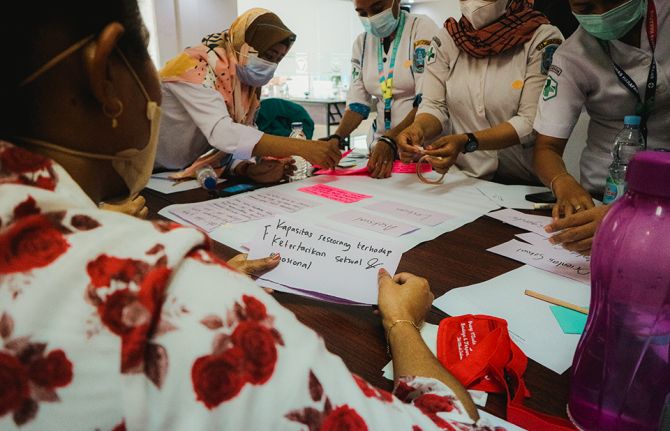
Feature Story
Public-private partnerships strengthen health systems and AIDS response
27 July 2009
27 July 2009 27 July 2009
“Phones for Health” is a partnership between a healthcare software provider Voxiva, a phone producer Motorola, a telecom company MTN, the GSMA Development Fund, PEPFAR, CDC Foundation, Accenture Development Partnerships and several governments. The integration of mobile technology and health applications enables health workers on the road to input and transfer health data to a central database where the data can be analysed. In addition, they can order medicines, send alerts, download guidelines, or access training materials.
This is one of several public-private initiatives showcased in a new UNAIDS report that looks at the contribution of AIDS-related public-private partnerships* to the six building blocks of health systems: service delivery; human resources; information; medicines and technologies; financing; and leadership.
HIV-related Public-Private Partnerships and Health Systems strengthening, highlights how the AIDS response has been a strong catalyst in the establishment of public-private partnerships for health, particularly in Africa. Many of these partnerships initially focused on HIV but they later expanded to cover wider health issues.
We hope the report will provide some guidance on critical steps private and public actors need to take to maximize the potential of public-private partnerships for the benefit of public health.
Regina Castillo , UNAIDS Private Sector Partnerships Chief
“This publication is innovative as it approaches public-private partnerships via a very specific angle: their applicability to strengthen the public sector,” said UNAIDS Private Sector Partnerships Chief, Regina Castillo. “We hope the report will provide some guidance on critical steps private and public actors need to take to maximize the potential of public-private partnerships for the benefit of public health,” Ms Castillo added.
UNAIDS has noted in its Outcome Framework 2009-2011 that substantial progress on a number of the Millennium Development Goals can be achieved by taking the AIDS response out of isolation and integrating it with efforts to achieve broader human development including the goal of health.
Research and interviews with representatives of private and public organization stakeholders as well as development partners were carried out. Twelve public-private partnerships with a strong collaborative relations with government institutions in the country of implementation were identified to present insider perspectives on catalysts and hurdles which may be encountered in developing collaborations. Good practices have been identified taken into consideration their sustainability, their integration in the national AIDS control plan, their measurable results, etc.
Some of the partnerships presented in the publication include North Star Foundation, BD’s Wellness Centres relieving the pressure on nurses in sub-Saharan Africa, DataDyne and Vodaphone Foundation developing health surveys with EpiSurveyor, Abbott Fund’s laboratory support from national to regional level in Tanzania, Mars supporting the National Health Insurance Scheme of Ghana, Fondation Sogebank managing Global Fund grants as Principal Recipient in Haiti, etc.
The topic of public-private partnerships was the focus of a breakout session of the Thematic Segment of the 23rd UNAIDS Programme Coordinating Board Meeting in Geneva on 15 December 2008. UNAIDS governing board then commissioned the Secretariat to compile “best practices and lessons learnt to support and facilitate public-private partnerships with respect to their applicability for strengthening the public sector in low and middle income countries”. “HIV-related Public-Private Partnerships and Health Systems Strengthening” is the result from this process.
To receive printed copies of the report, please contact Marie Engel, email engelm@unaids.org
* A Public-Private Partnership is defined as an “institutional relationship between the state and the private profit and/or the private non-profit sector, where the different public and private actors jointly participate in defining the objectives, methods and implementation of an agreement of cooperation”.
Public-private partnerships strengthen health sys
Contact:
Marie Engel
Email: engelm@unaids.org
Publications:
HIV-related Public-Private Partnerships and Health Systems Strengthening (pdf)
Joint Action for Results: UNAIDS Outcome Framework 2009-2011 (pdf, 396 Kb.)



